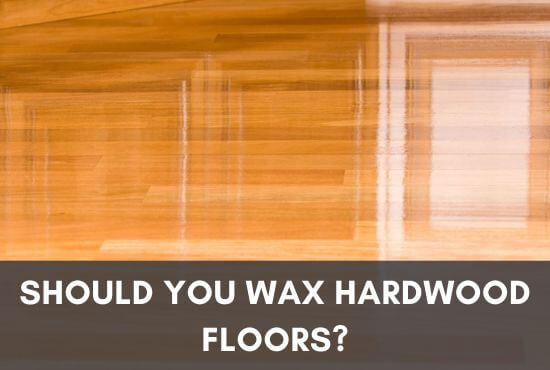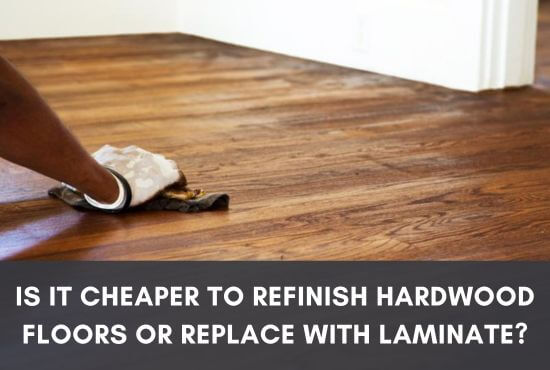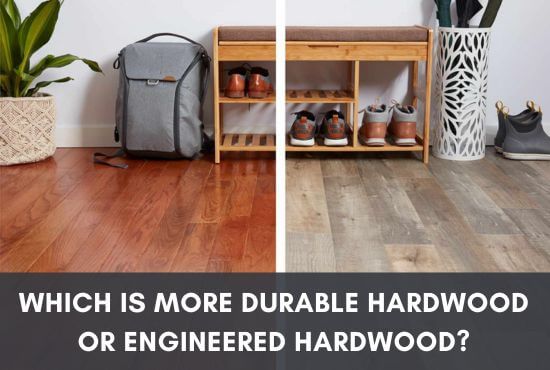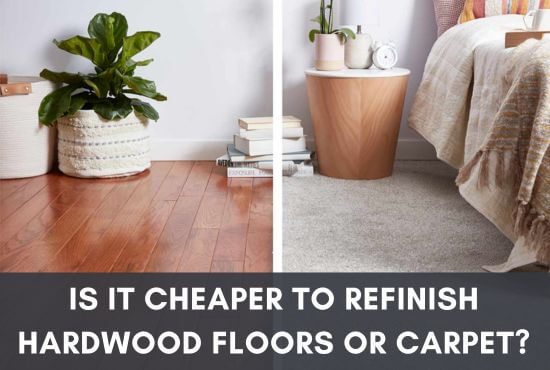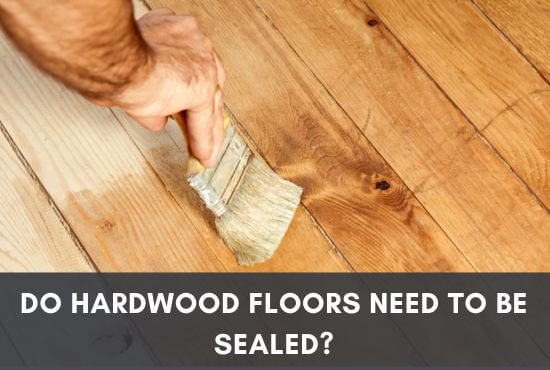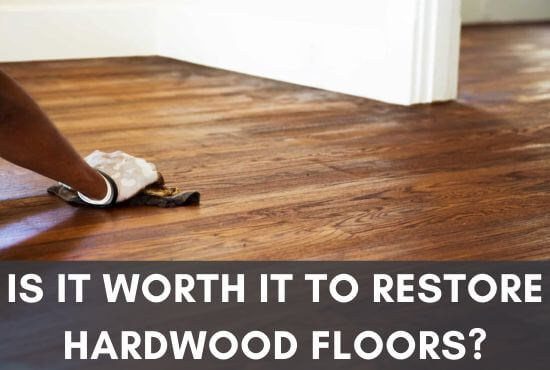Hardwood floors are unanimously considered as one of the best flooring options one can have in their house. It is a luxury as well as an investment that gives you a reasonable return.
Hardwood floors not only adorn the appearance of your house but also increase your estate’s net worth.
However, many people get worried that their investment will get worn out in a few years.
Hardwood floors typically last 70-80 years, but proper maintenance and wood quality can affect this lifespan. With proper care, they can last as little as 50 years or as long as a century. Treatment and maintenance play a crucial role in determining the longevity of hardwood floors.
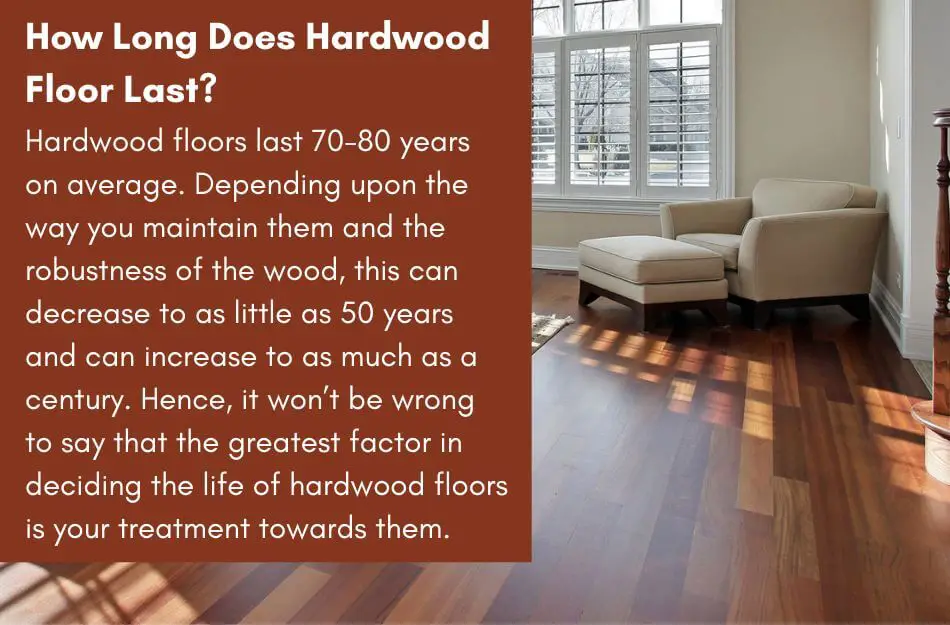
There are many factors that affect the lifespan of hardwood floors. Let’s dive deeper and find out how the longevity of hardwood floors is deduced.
Table of Contents
Factors Affecting Lifespan of Hardwood Floors
Hardwood flooring is a durable option considered a lifetime investment. Once hardwood floors are installed, you might not need to replace them again.
If they are maintained properly and taken care of, you can expect them to last at least 7-8 decades.
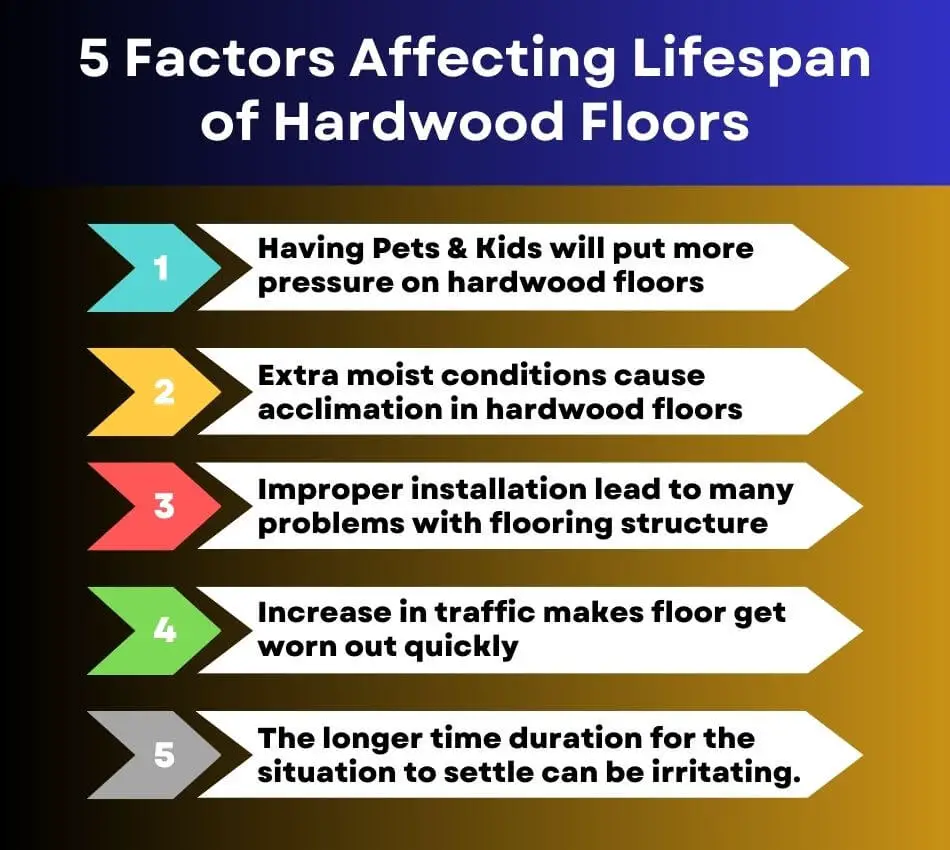
The time range can vary according to your daily usage and how you treat your hardwood floors.
However, there are some other factors as well which will determine the life of your hardwood floors:
Having Pets & Kids
A family of adults might put less pressure on the hardwood floors than a family with pets and children.
While they are all cute and cozy, they can increase the amount of wear and tear on your hardwood floors.
Pets such as dogs and cats have nails on their paws, which can increase the number of scratches your hardwood floors will receive.
Moreover, if you have children at home, they might play with their toys on the floor.
This also translates to additional traffic for your floors, which would take a few years off the total longevity of the floors.
In addition, kids can cause spillages on the floors quite frequently, and it can be hard to prevent them from doing that.
However, these spillages can seep into the planks and cause them to swell and chip. In worst cases, the spills can seep down to the subflooring and damage it.
This would damage the hardwood floors, which need to be repaired, hence, taking some time off of the total time your floors would last.
Also Read: Is It Cheaper To Refinish Hardwood Floors Or Replace With Laminate?
Humid Environments
Humidity is one of the greatest foes of hardwood floors. Extra moist and humid conditions can cause acclimation in the hardwood floors and force them to soak up the moisture to the point where they have reached the moisture equilibrium (when the wood contains as much humidity as the air). The moisture in wood floors makes floor bouncy.
This can lead to the same problems of swelling, crowning, or even chipping if the moisture is too much. Hence, your hardwood floors would perform better than in a dry environment.
Besides, high moisture areas can lead to other problems, such as molds and mildew, which may lead to infections in your hardwood flooring.
These molds can clog the wood’s surface and disallow breathing.
Besides, due to the increased bacterial and fungal content in the molds, there is a high chance of rotting or decaying among your wooden planks, which will surely decrease the life of your hardwood floors.
Improper Installation
Improper installation can lead to many problems with your hardwood flooring structure, leading to a decrease in lift.
If the floors were not properly installed or the subflooring platform needed to be properly built, you might face many problems, such as buckling, lifting, and more.
A common example is using too few or substandard nails and screws, which loosen up after some time, causing your boards to become squeaky.
Moreover, using the wrong type of adhesive can also cause your hardwood floors to come off and cause damage to the planks.
Hence, getting the right installation services is crucial so you don’t have to face such damages in the future.
If your home’s foundation is not settled and is shifting. New-build homes are known for foundation issues.
Over time, your home’s foundation settles and shifts, which can wreak havoc on your hardwood floors.
If you live in a newer home, be sure your hardwood flooring was installed with a settling foundation in mind, as there are ways to set your flooring up for success as your foundation shifts.
Also, have the floorboards installed perpendicular to the floor joists. This will help reduce the chance of the planks separating or buckling.
Traffic
The way your hardwood floors are used affects their longevity and determines how long the floors will last you.
This factor will also decide the life and the time before which you must get the hardwood floors refinished. Usually, domestic hardwood floors receive less traffic than commercial ones.
Furthermore, some areas in the house receive less traffic than others; for instance, a TV lounge compared to a bedroom, and the same goes for commercials.
An increase in traffic would mean the finish on your hardwood floors will get worn out quickly, and your floors will receive higher wear and tear, while a decrease in traffic can increase the amount of time the finish and the floorings may last.
A general rule of thumb is that your hardwood floors will give you an extra 5 or 10 years if there is mild traffic; if the traffic is very low such as in a bedroom in a house, you can expect the lifespan to increase by 5-10 years.
Whereas if the traffic is very high, for instance, in a commercial building, your hardwood floors will give you 7-8 years less than the average lifespan.
See Also: Can I Stay In My House While Hardwood Floors Are Refinished?
Improper Maintenance
If you have all the factors mentioned earlier taken care of but don’t maintain your hardwood floors, there is a high chance that you will take off many years from your total life.
Timely maintenance and proper care are among the best ways to ensure the longevity of your hardwood floors and are effective in even increasing it.
If you overlook the condition of your hardwood floors, there is a high chance that all the factors mentioned above will combine and cause deterioration.
Excessive humidity, spills, mild scratches, additional wear and tear, molds, and dirt buildup are all factors that can be countered with proper cleaning and care of your hardwood floors.
It is crucial to clean, disinfect and polish your hardwood floors on a regular basis if you want to keep them in their pristine condition.
Doing so can limit the possibilities of damage your hardwood floor can receive and will increase its life by many years.
While most of the factors mentioned earlier are not in your control if the floors are already installed, you can at least take care of this factor to ensure that you are doing the most on your part and doing justice to your hardwood floors.
How Long Does Hardwood Floor Last?
Hardwood floors usually last between 7-8 decades. Hardwood floors are one of the most sought options when it comes to laying flooring in the house.
They are considered a premium luxury and an investment that will make your house look more aesthetic and beautiful and increase the property’s overall value.
As it is an investment and cherished by almost all homeowners, many are concerned about the lifespan of the flooring and often worry if their floors will start to show signs of wear too soon.
As mentioned above, many factors affect the life of your hardwood floors, including the amount of traffic they will receive, such as the amount of traffic, maintenance routine, the installation method used, and the environments it lasts in.
However, all hardwood floors are known to last for 40-50 years. Depending on the quality of your wood and the maintenance, your hardwood floors might even last more than this.
Some wood types are known to last even 100 years with extensive maintenance and timely refinishing.
Hence, hardwood floors generally last for 50 years, but you can add a decade or two with proper care and another decade or two with timely refinishing of your floors.
Moreover, the type of wood used in your flooring is also a major factor determining the life of your hardwood floors.
Hence, the lifespan of your hardwood floors can be determined according to all these factors.
Combining the attributes of all these pointers, you can estimate how long your hardwood floors will last according to your situation.
The Longevity And Life Span Of Different Wooden Floors
The type of wood in your hardwood floors is a major factor in determining the life of your hardwood floors.
Despite all the other factors, if your hardwood floors are made from a naturally long-lasting wood type, you will not face much trouble as the wood’s resilience will counter many factors for you.
However, if the type of wood on your floors needs to be more durable, you will have to be extra careful with the maintenance and treatment of your hardwood floors not to start the decaying or rotting process too quickly.
Generally, you can get all the necessary details from your manufacturer, which will help you understand the overall lifespan of your hardwood floors; however, we have also compiled a list for you so you can have a basic idea of the types of woods and their average lifespans.
Related: Is It Worth It To Restore Hardwood Floors: An In-Depth Guide
Oak
Oak flooring is considered the toughest and one of the oldest types of wooden flooring. It is usually categorized as a durable wood with a luxurious texture.
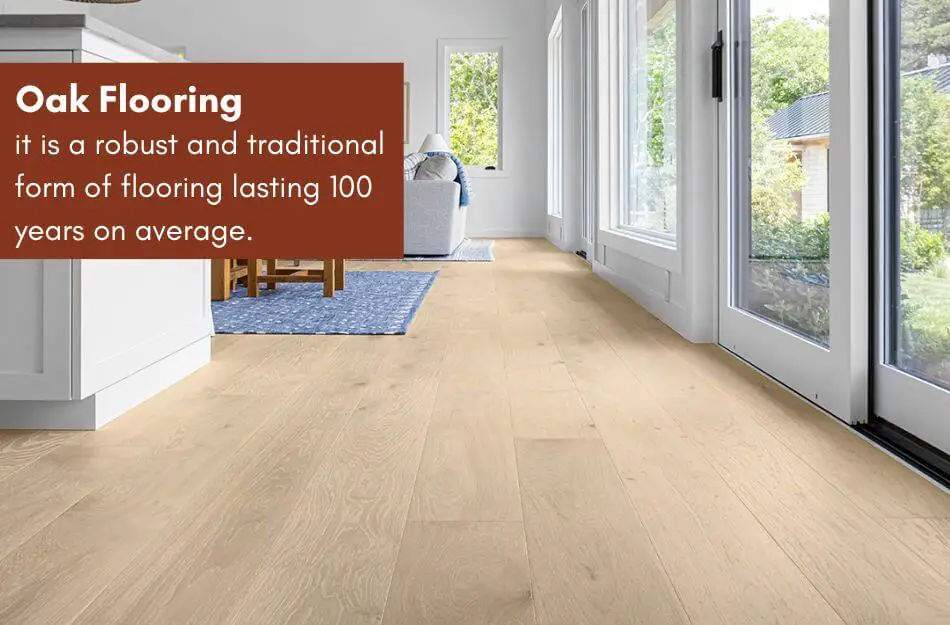
Besides, it is a robust and traditional form of flooring lasting 100 years on average.
Maple
Maple is the right option for those who want an affordable solution and don’t want to get into the very expensive types of flooring options yet enjoy the luxury of maple hardwood flooring.
It does not ask one to cut deep into their pockets and still enjoy the hardwood floor.
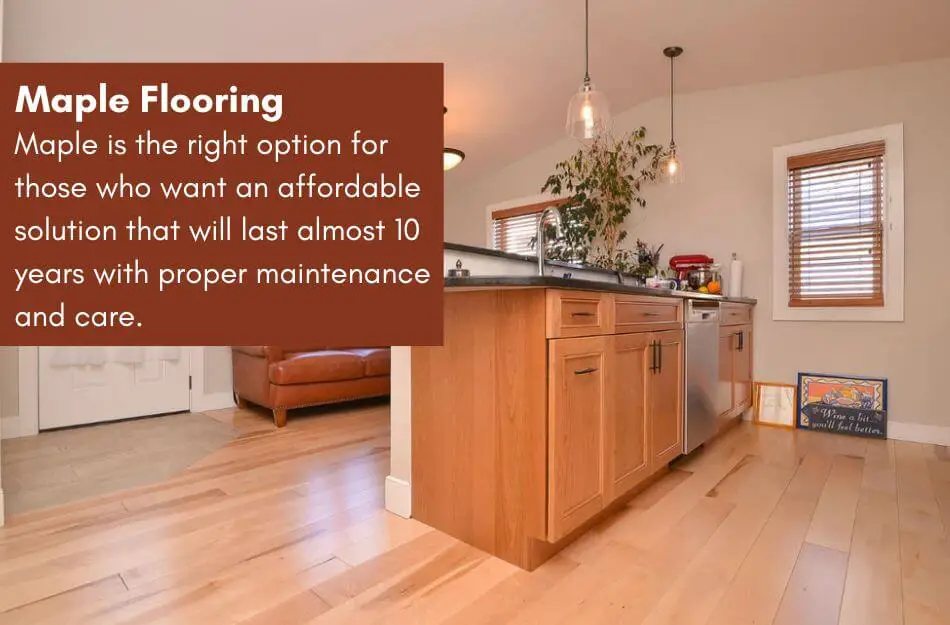
However, this affordability comes at the cost of durability, as maple will last you almost 10 years with proper maintenance and care.
But provided with the cheap rates, it is still worth the money if you can’t afford much or want to flip the house in some time.
Ash
Ash is yet another durable type of wood that is used in flooring (1). It has many traits which make it resilient and robust.
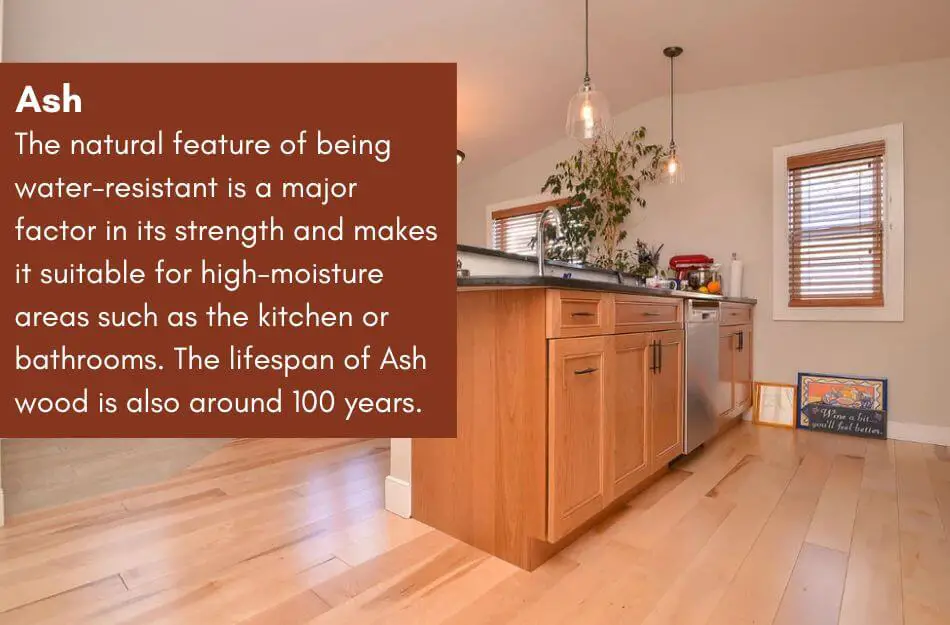
The natural feature of being water-resistant is a major factor in its strength and makes it suitable for high-moisture areas such as the kitchen or bathrooms.
The lifespan of this wood is also around 100 years.
Don’t Miss: Will Buckled Hardwood Floors Go Back To Normal?
Hickory
Hickory wood flooring is also very durable and sturdy but comes with a high price tag mainly due to its uniqueness.
It is said to be stronger than even white oak, which makes it a suitable flooring option if you are looking for a long-term solution.
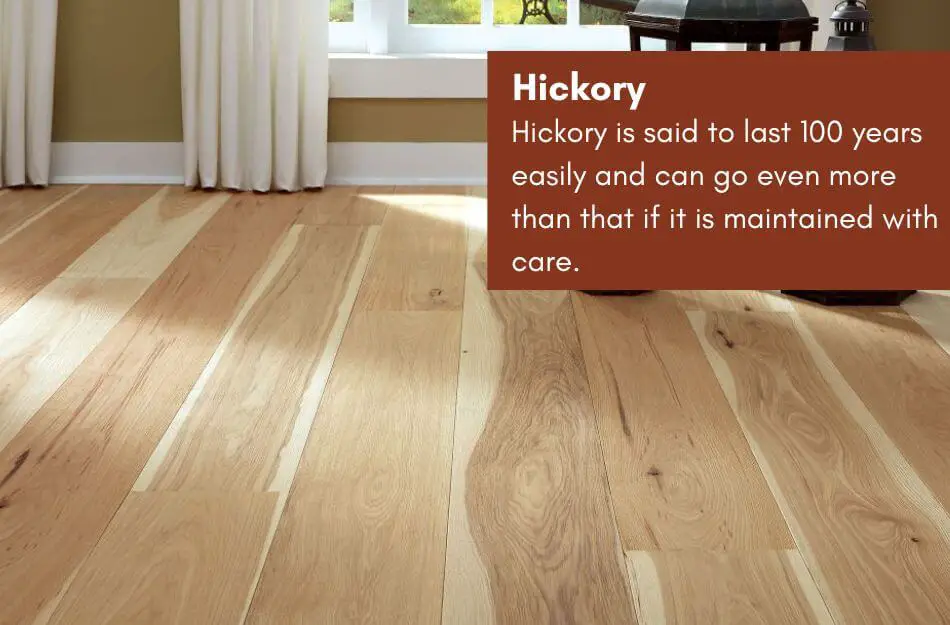
Besides, the water-resistant nature makes it suitable for all types of environments and increases the functionality of the wood.
Hickory is said to last 100 years easily and can go even more than that if it is maintained with care.
Walnut
This is one of the most popular flooring types as it is not too pricey and gives you a decent level of resistance against weather corrosion.
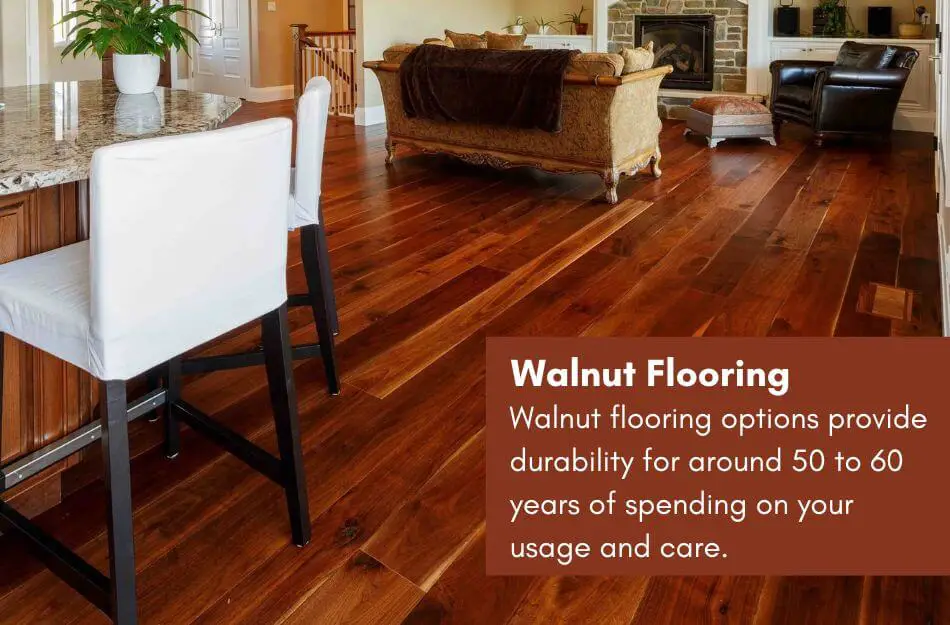
Moreover, it also has a nice look, adding to its package. Walnut flooring options provide durability for around 50 to 60 years of spending on your usage and care.
This is quite decent, considering the price range and the segment it falls into.
How Long Do Refinished Hardwood Floors Last?
Refinished hardwood floors last around 10 years before they wear out or require another finish.
Hardwood floors can take extreme loads and bear extreme amounts of traffic, mainly due to the sealing coat on top, which protects them from various factors such as scratches, dents, scuff marks, stains, and grit.
Over time, this layer gets thinner to the point where another coat must be applied to protect your hardwood floors.
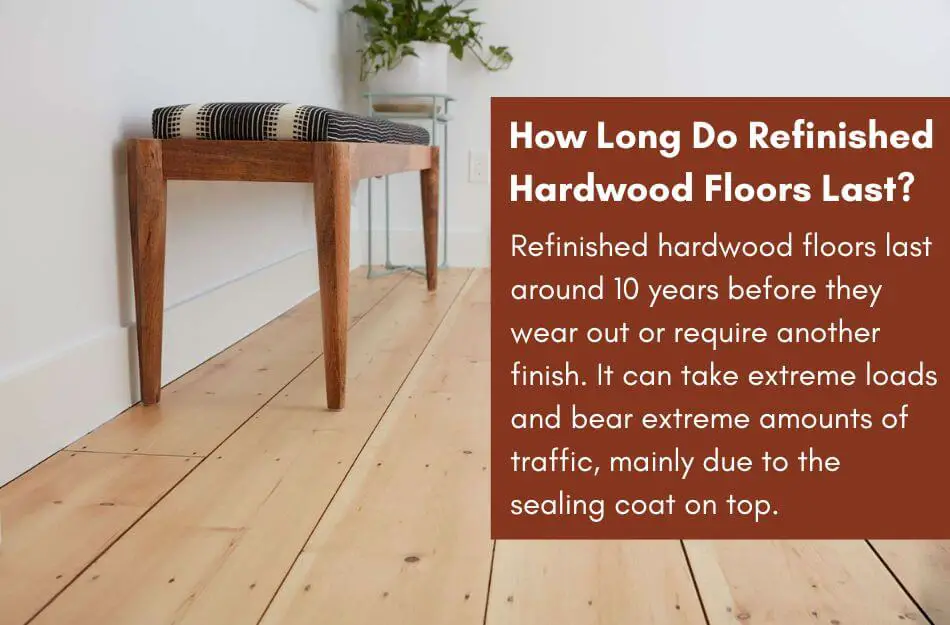
Depending upon the type of finish you have used and the amount of traffic your floors received, the time your finished floors will last can vary.
If you have used polyurethane finishes, they may last around 4-6 years, depending on whether you used water or oil-based.
You can expect the same results in wax layers; however, you can recoat both of these occasionally, and it won’t be before almost 10 years that you require another refinish.
Also Read: Why Does My Hardwood Floor Shake When I Walk? (Solved)
How Often Do Hardwood Floors Need To Be Refinished?
Usually, hardwood floors are required to be refinished every 3-5 years. However, this figure can greatly vary as the usage, traffic, and finish type differs in every scenario.
For polyurethane finishes, remember that they would need to be refinished every 3-5 years, and the same goes for wax coatings.
However, you can skip the refinishing for some time and add another coat to the point where the finish starts to build up. After this happens, you must get a refinish immediately.
Takeaway
Hardwood floors can last a lifetime if properly managed and maintained.
It is preferred to select a durable type of wood and ensure proper installation and treatment to increase its longevity.
Trying to save money on a few steps is not a wise decision as it will lead to a decrease in the lifespan or problems that may arise quickly after installation.
Hence, it would be better to get all the steps right and ensure that your hardwood floors are cared for properly.
This way, you won’t have to face a lot of problems, and damage to your hardwood floors will be minimal. Besides, the life of the floor will also be extended by a great factor.

As a co-creator of FlooringFlow.com, Emma Sophia comes on board to answer all your questions related to any flooring problems. Together with John Henry, she’s gained extensive experience in fixing many flooring problems in their own house as well as in friends and family’s. Now, she wants to share her knowledge that she gained during floor remodeling, restoring, and DIY projects.

